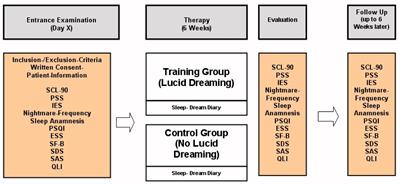Cognitions in Sleep – Lucid Dreaming as an Intervention for Nightmares in Patients with PTSD
About 80% of PTSD patients suffer from nightmares or dysphoric dreams that cause major distress and impact nighttime or daytime functioning.

Lucid Dreaming (LD) is a learnable and effective strategy to cope with nightmares and has positive effects on other sleep variables. In LDs, the dreamer is aware of the dreaming state and able to control the dream content.
The aim of this study is to evaluate the effectiveness of Lucid Dreaming Therapy (LDT) in patients suffering from PTSD. We suggest that learning a technique that enables the affected subjects to regulate the occurrence and content of nightmares autonomously increases the chance of coping with the complex symptoms of PTSD and can reduce suffering. Sleep Quality (PSQI), daytime sleepiness (ESS), quality of life (MQLI), psychological distress (SCL-90-R), distress caused by traumatic events (IE-S), anxiety (SAS), depression (SDS) and nightmare severity were assessed in a self-rating questionnaire before and after the intervention. LDT had no effect on the investigated sleep variables. No correlation between reduction of nightmare severity and changes in PTSD-profile (IE-S) was found. Nevertheless, levels of anxiety and depression decreased significantly in the course of therapy. LDT could provide an alternate or complementary treatment option for nightmares in PTSD, specifically for symptoms of anxiety and depression. .
Read the full article at the original website
References:
